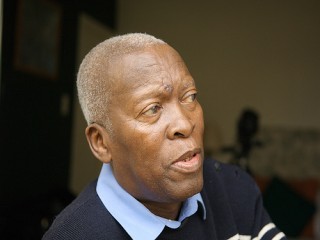
Lewis Nkosi biography
Date of birth : 1936-12-05
Date of death : 2010-12-05
Birthplace : Natal, South Africa
Nationality : South African
Category : Famous Figures
Last modified : 2011-10-16
Credited as : writer, essayist, African literature
Lewis Nkosi is known chiefly for his scholarly studies of contemporary African literature, and is the author of the novel Mating Birds (1986). Critics enthusiastically praised Nkosi's prose style and narrative structure in Mating Birds, and several have compared the work with Albert Camus's The Stranger.
Nkosi was born in Natal, South Africa, and attended local schools before enrolling at M. L. Sultan Technical College in Durban. In 1956 he joined the staff of Drum magazine, a publication founded in 1951 by and for African writers. In his Home and Exile and Other Selections (1965), Nkosi described Drum's young writers as "the new African[s] cut adrift from the tribal reserve— urbanised, eager, fast-talking and brash." According to Neil Lazarus, the description fitted Nkosi as well. "Nkosi's whole bearing as a writer," he wrote, "was decisively shaped by the years in Johannesburg working for the magazine." In 1960 Nkosi left South Africa on a one-way "exit permit" after accepting a fellowship to study at Harvard University. Now living in England, he teaches and writes articles on African literature. In addition to the novel Mating Birds, he has also produced several plays and collections of essays, including The Rhythm of Violence (1963), Malcolm (1972), The Transplanted Heart: Essays on South Africa (1975), and Tasks and Masks: Themes and Styles of African Literature (1981).
Mating Birds tells the story of Sibiya, who spots a white woman across a fence on a segregated beach in Durban. Although the rules of apartheid keep them from speaking to each other, they begin a wordless flirtation across the fence. Soon Sibiya becomes obsessed with the woman and follows her everywhere. He learns that her name is Veronica and that she is a stripper at the local nightclub. One day Sibiya follows Veronica to her bungalow. Seeing him, she undresses in front of the open door and lies down on the bed. Sibiya enters her bedroom and has sex with her. Shortly after, they are discovered, and Veronica accuses Sibiya of rape. He is then beaten, arrested, and sentenced to death.
Many critics viewed Mating Birds as a commentary on South Africa's system of apartheid. George Packer, for example, observed: "Mating Birds feels like the work of a superb critic. Heavy with symbolism, analytical rather than dramatic, it attempts nothing less than an allegory of colonialism and apartheid, one that dares to linger in complexity." Other commentators, however, attacked the novel's ambiguous depiction of rape. "Nkosi's handling of the sexual themes complicates the distribution of our sympathies, which he means to be unequivocally with the accused man," noted Rob Nixon in the Village Voice. "For in rebutting the prevalent white South African fantasy of the black male as a sex-crazed rapist, Nkosi edges unnecessarily close to reinforcing the myth of the raped woman as someone who deep down was asking for it." For Henry Louis Gates, Jr., even the question of whether Sibiya raped at all remains unclear. This causes problems for the reader, as "we are never certain who did what to whom or why." Sibiya himself is unsure: "But how could I make the judges or anyone else believe me when I no longer knew what to believe myself? … Had I raped the girl or not?" Gates responded: "We cannot say. Accordingly, this novel's great literary achievement—its vivid depiction of obsession— leads inevitably to its great flaw." Sara Maitland further objected to Nkosi's portrayal of the white woman: "Surely there must be another way for Nkosi's commitment, passion and beautiful writing to describe the violence and injustice of how things are than this stock image of the pale evil seductress, the eternally corrupting female?"
Despite the novel's shortcomings, Michiko Kakutani concluded in the New York Times, Mating Birds "nonetheless attests to the emergence of … a writer whose vision of South Africa remains fiercely his own." Similarly, Sherman W. Smith lauded: "Lewis Nkosi certainly must be one of the best writers out of Africa in our time."
Exiled after leaving South Africa to study at Harvard University, Lewis Nkosi has written short stories, plays, and criticism from his adopted home in England. Much of his work, however, deals with African literature and social concerns. "As a playwright and short-story writer, he is also the most subtly experimental of the black South African writers, many of whom are caught in the immediacy of the struggle against apartheid," comments Henry Louis Gates, Jr. in the New York Times Book Review. According to Alistair Niven in British Book News Nkosi is "one of the architects of the contemporary black consciousness in South Africa."
















